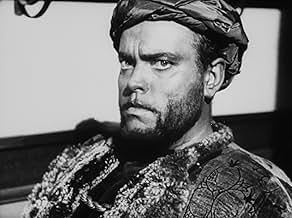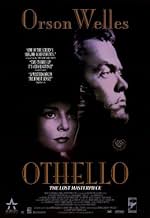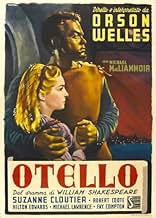IMDb-BEWERTUNG
7,5/10
9948
IHRE BEWERTUNG
Dem maurischen General Othello wird vorgegaukelt, dass seine neue Frau Desdemona eine Affäre mit seinem Leutnant Cassio hat, obwohl dies in Wirklichkeit alles Teil des Plans eines verbittert... Alles lesenDem maurischen General Othello wird vorgegaukelt, dass seine neue Frau Desdemona eine Affäre mit seinem Leutnant Cassio hat, obwohl dies in Wirklichkeit alles Teil des Plans eines verbitterten Fähnrichs namens Jago ist.Dem maurischen General Othello wird vorgegaukelt, dass seine neue Frau Desdemona eine Affäre mit seinem Leutnant Cassio hat, obwohl dies in Wirklichkeit alles Teil des Plans eines verbitterten Fähnrichs namens Jago ist.
- Regie
- Drehbuch
- Hauptbesetzung
- Auszeichnungen
- 1 Gewinn & 1 Nominierung insgesamt
Abdullah Ben Mohamet
- Pageboy
- (Nicht genannt)
Joseph Cotten
- Senator
- (Nicht genannt)
Jean Davis
- Montano
- (Nicht genannt)
Joan Fontaine
- Page
- (Nicht genannt)
Robert Rietty
- Lodovico
- (Synchronisation)
- (Nicht genannt)
Gudrun Ure
- Desdemona
- (Synchronisation)
- (Nicht genannt)
Empfohlene Bewertungen
10EddieK
Considerable controversy has surrounded the 1992 restoration and re-release of Orson Welles' "Othello." First, the film was wrongly labelled a "lost classic" - not technically true, as Welles aficionados will realize. More seriously, the restoration crew (under the aegis of Welles' daughter, Beatrice Welles) re-synced the dialogue and re-recorded the musical score - an abomination to Welles purists. While it would have been preferable to adhere to Welles' vision for the film, such an endeavor becomes extremely difficult when no written record of Welles' intent exists (as it did with his famous 26-page memo to Universal regarding "Touch of Evil"). So it's true that the restored version lacks a degree of authenticity, but what are the alternatives? Grainy, scratched, poorly synced public domain prints (c.f. "Mr Arkadin" and "The Trial")? Or, worse, no available copy at all (c.f. "Chimes at Midnight")?
Anyway, on to the film. "Othello's" existence helps disprove the charges of profligacy and "fear of completion" that plagued Welles' career after "Citizen Kane." Shot over four years in Morocco and Italy, and financed largely by Welles himself, "Othello" manages to avoid a low-budget look, thanks largely to virtuoso editing that masks the incongruities of time and space. Welles' powers of invention are on full display here, most obviously in the famous Turkish bath scene (an improvised set necessitated by a lack of costumes). Set designer Alexandre Trauner's astute choice of Moroccan and Venetian locations instantly establishes a geographic authenticity; Welles initially exploits them for all their stark beauty before retreating into noirish interiors, underscoring Othello's descent into darkness.
Aside from Michael Macliammoir's chilling Method performance as Iago, the acting in Welles' "Othello" has been criticized as too restrained and modulated for Shakespearean tragedy. Such criticism is largely unwarranted, for this "Othello" is as much for the eyes as the ears: Welles' bold framing and expressionistic camera angles free the play from its theatrical moorings (pun intended), undermining the need for stage elocution. Indeed, the camera is the true star of this film, as Welles generates images that match the grandeur and eloquence of Shakespeare's language.
Anyway, on to the film. "Othello's" existence helps disprove the charges of profligacy and "fear of completion" that plagued Welles' career after "Citizen Kane." Shot over four years in Morocco and Italy, and financed largely by Welles himself, "Othello" manages to avoid a low-budget look, thanks largely to virtuoso editing that masks the incongruities of time and space. Welles' powers of invention are on full display here, most obviously in the famous Turkish bath scene (an improvised set necessitated by a lack of costumes). Set designer Alexandre Trauner's astute choice of Moroccan and Venetian locations instantly establishes a geographic authenticity; Welles initially exploits them for all their stark beauty before retreating into noirish interiors, underscoring Othello's descent into darkness.
Aside from Michael Macliammoir's chilling Method performance as Iago, the acting in Welles' "Othello" has been criticized as too restrained and modulated for Shakespearean tragedy. Such criticism is largely unwarranted, for this "Othello" is as much for the eyes as the ears: Welles' bold framing and expressionistic camera angles free the play from its theatrical moorings (pun intended), undermining the need for stage elocution. Indeed, the camera is the true star of this film, as Welles generates images that match the grandeur and eloquence of Shakespeare's language.
Right from the start, Othello has a striking visual style. Oblique camera angles (from low and high, close and far), nice use of shadows, a cool-looking castle. Really nice black-and-white imagery to look at.
On the other hand, I wasn't as convinced by the story and acting (but they grew on me as the film continued). There are many parts where actors seem to rush or mumble their lines. Shakespeare is hard enough to follow and a good performance should draw you in and make the dialogue *easier* to understand. Characters are often facing away so we hear their lines but can't see their mouths or their facial expressions. What's the point of acting then? I can act if acting means reciting lines from a Shakespearean play.
I have since learned that Welles was struggling with funds for the movie and that explains some of its short-comings. Especially with sound. He had to dub some of the lines himself and there remain parts which are clearly out of sync. It's hilarious to learn that he borrowed/took costumes from another movie to use on Othello. And that costumes weren't ready for one scene so he changed the location to a bathhouse with the actors in towels.
I find the story flawed. Iago is single-handedly able to manipulate Othello to his will. Iago is unlikable because of his misanthropy but Othello may be even more unlikable in his stupidity. He never thinks to properly analyse or question what Iago presents to him as the truth. He barely seems to communicate with his wife at all and becomes consumed by his obsessions and assumptions. But I do somewhat admire Iago's patience and intelligence, he makes a good villain. And there is real tragedy to what happens. It's conceivable that some unfortunate coincidences could help a seed of suspicion grow into the full-hearted conviction that you're being lied to. And to desire revenge is all too human. It's just funny that nobody suspects Iago. Othello would prefer to believe that everyone else is against him.
I found the ending climactic and meaningful. Some of it took me by surprise, other parts felt inevitable. I'm aware that Welles shortened the play a lot and may have taken liberties with it. At least I now have a rough idea of what Othello is about; I feel more educated. I liked all of the actors but Micheál MacLiammóir (a Dublin actor in his only feature film role) stands out as the antagonist. There's something about his eyes and calm indifference. Less is more.
Summarising, Othello is rewarding for its villain, its believable tragic turn of events and the enjoyable, creative cinematography. Now if only Othello could learn the scientific method...
On the other hand, I wasn't as convinced by the story and acting (but they grew on me as the film continued). There are many parts where actors seem to rush or mumble their lines. Shakespeare is hard enough to follow and a good performance should draw you in and make the dialogue *easier* to understand. Characters are often facing away so we hear their lines but can't see their mouths or their facial expressions. What's the point of acting then? I can act if acting means reciting lines from a Shakespearean play.
I have since learned that Welles was struggling with funds for the movie and that explains some of its short-comings. Especially with sound. He had to dub some of the lines himself and there remain parts which are clearly out of sync. It's hilarious to learn that he borrowed/took costumes from another movie to use on Othello. And that costumes weren't ready for one scene so he changed the location to a bathhouse with the actors in towels.
I find the story flawed. Iago is single-handedly able to manipulate Othello to his will. Iago is unlikable because of his misanthropy but Othello may be even more unlikable in his stupidity. He never thinks to properly analyse or question what Iago presents to him as the truth. He barely seems to communicate with his wife at all and becomes consumed by his obsessions and assumptions. But I do somewhat admire Iago's patience and intelligence, he makes a good villain. And there is real tragedy to what happens. It's conceivable that some unfortunate coincidences could help a seed of suspicion grow into the full-hearted conviction that you're being lied to. And to desire revenge is all too human. It's just funny that nobody suspects Iago. Othello would prefer to believe that everyone else is against him.
I found the ending climactic and meaningful. Some of it took me by surprise, other parts felt inevitable. I'm aware that Welles shortened the play a lot and may have taken liberties with it. At least I now have a rough idea of what Othello is about; I feel more educated. I liked all of the actors but Micheál MacLiammóir (a Dublin actor in his only feature film role) stands out as the antagonist. There's something about his eyes and calm indifference. Less is more.
Summarising, Othello is rewarding for its villain, its believable tragic turn of events and the enjoyable, creative cinematography. Now if only Othello could learn the scientific method...
Orson Welles' short, low-budget, and in places fairly odd look at Shakespeare's play. It suffers from some stage-bound performances which don't quite work (Micheal MacLiammoir as Iago, Robert Coote as Rodrigo) plus an undefined Desdemona from Suzanne Cloutier.
However, this aside, Welles is marvellous as the Moor driven to jealousy and murder, his voice rolling through the meat of Othello's speeches, his bronze make-up creating a skin for the great general. For this performance alone the film is valuable. And it looks absolutely fantastic, springing off from its financial limitations and adding a new dimension to the often-told story.
However, this aside, Welles is marvellous as the Moor driven to jealousy and murder, his voice rolling through the meat of Othello's speeches, his bronze make-up creating a skin for the great general. For this performance alone the film is valuable. And it looks absolutely fantastic, springing off from its financial limitations and adding a new dimension to the often-told story.
The power of Welles performance should make anyone not already an admirer stand up and take notice. The dark, brooding nature of Welles character sets the tone throughout this film. Each of the prominent characters seems to feed off this intensity, making each the better for it. The spartan sets and excellent use of lighting add to this powerful delivery making the words feel true and soul wrenching. I think this production could have been played out on a bare stage and still be regarded as a fine work, the dialogue and delivery is of such fine caliber. "The Moor of Venice" is a fine example of Orson Welles vast talents as a performer and director and should not be missed.
THE TRAGEDY OF OTHELLO: THE MOOR OF VENICE/ US/France/Italy/Morocco 1952 (3.5 STARS)
The recent restoration of Othello brings to cinematic space the magic of another masterpiece from Orson Welles. To think that a whole master negative of this film (which won the Best film at Cannes in 1952) was lying abandoned in a New Jersey warehouse, was discovered by accident and is the reason for this print that we now have access to, is enough to send shivers down the spine of any Welles-phile. . Mise-en-scene: Like with many of his other works involving especially Shakespeare, be prepared for Welles' licenses and personal interpretation of subject matter pertaining to Othello. Yet at the end, we are left with a feeling of deep tragedy and loss for Othello, played by Welles himself, and though we feel that Othello was quite an idiot, we at least feel that he was a very unfortunate idiot at that! . The problem may have been that the critical scene where Iago poisons Othello's mind and fuels his suspicion is scrappy and left unexplored. This may well have had little to do with Welles' artistic choices, and more with his monetary situation at the time. Welles' penury through his European sojourn is widely known and the passion with which he would invest into his films, every penny earned through moonlighting his booming voice and above-average acting skills is legendary, and should put this in context.
. The figure behavior of Micheál MacLiammóir is utterly convincing as the detestable Iago who is consumed by jealousy and rage at being overlooked as the second-in-command. But the person to steal our hearts is Suzanne Cloutier who portrays the fair-dame Desdemona. She is every bit as dainty as we would have imagined her to be. . The stripped down set design works wonderfully for the film and even though budgets may have been the driving force, Othello's barren palace is preceded only by the barrenness of his blinding jealousy and irrational actions. . Cinematography: As we have come to expect, Orson Welles has a unique cinematic language, through which he creates a Wellesian world of skin-burning close ups, dutched crazy world-frames and low angle shots to create a tense atmosphere of foreboding. But there is no better example of exploring and using frame depth than in Othello. Time and again Welles plays with foreground element to reveal psychologically subjective and meta-diagetic moods while cleverly using the depth in the frame to forward the narrative and plot the next progression. The title shots of the film are harrowing in their effect, with the interplay of high-contrast earth and sky contours that at once establish the mood for an intense cinematic experience. . Sound & Editing: The restored version has a brand-new soundtrack mentored by Welles' daughter, and while it enhances the experience to telling effect, it is irony to note that just the new soundtrack cost much more than what Welles assembled the whole film for. The fact that parts of the film were shot MOS and other parts used ADR is distracting due to the obvious lack of lip-sync, but in the final analysis, we watch Welles with reverence almost as if on a visit to Sunday Mass, paying homage, never once forgetting that were are witness to a filmmaker stripped of resources, devoid of many essential tools, but one with indomitable spirit who refused to be cowed-down. Othello is magical in its story telling and another worthy showcase of the genius of Orson Welles.
The recent restoration of Othello brings to cinematic space the magic of another masterpiece from Orson Welles. To think that a whole master negative of this film (which won the Best film at Cannes in 1952) was lying abandoned in a New Jersey warehouse, was discovered by accident and is the reason for this print that we now have access to, is enough to send shivers down the spine of any Welles-phile. . Mise-en-scene: Like with many of his other works involving especially Shakespeare, be prepared for Welles' licenses and personal interpretation of subject matter pertaining to Othello. Yet at the end, we are left with a feeling of deep tragedy and loss for Othello, played by Welles himself, and though we feel that Othello was quite an idiot, we at least feel that he was a very unfortunate idiot at that! . The problem may have been that the critical scene where Iago poisons Othello's mind and fuels his suspicion is scrappy and left unexplored. This may well have had little to do with Welles' artistic choices, and more with his monetary situation at the time. Welles' penury through his European sojourn is widely known and the passion with which he would invest into his films, every penny earned through moonlighting his booming voice and above-average acting skills is legendary, and should put this in context.
. The figure behavior of Micheál MacLiammóir is utterly convincing as the detestable Iago who is consumed by jealousy and rage at being overlooked as the second-in-command. But the person to steal our hearts is Suzanne Cloutier who portrays the fair-dame Desdemona. She is every bit as dainty as we would have imagined her to be. . The stripped down set design works wonderfully for the film and even though budgets may have been the driving force, Othello's barren palace is preceded only by the barrenness of his blinding jealousy and irrational actions. . Cinematography: As we have come to expect, Orson Welles has a unique cinematic language, through which he creates a Wellesian world of skin-burning close ups, dutched crazy world-frames and low angle shots to create a tense atmosphere of foreboding. But there is no better example of exploring and using frame depth than in Othello. Time and again Welles plays with foreground element to reveal psychologically subjective and meta-diagetic moods while cleverly using the depth in the frame to forward the narrative and plot the next progression. The title shots of the film are harrowing in their effect, with the interplay of high-contrast earth and sky contours that at once establish the mood for an intense cinematic experience. . Sound & Editing: The restored version has a brand-new soundtrack mentored by Welles' daughter, and while it enhances the experience to telling effect, it is irony to note that just the new soundtrack cost much more than what Welles assembled the whole film for. The fact that parts of the film were shot MOS and other parts used ADR is distracting due to the obvious lack of lip-sync, but in the final analysis, we watch Welles with reverence almost as if on a visit to Sunday Mass, paying homage, never once forgetting that were are witness to a filmmaker stripped of resources, devoid of many essential tools, but one with indomitable spirit who refused to be cowed-down. Othello is magical in its story telling and another worthy showcase of the genius of Orson Welles.
Wusstest du schon
- WissenswertesWhen he made Die schwarze Rose (1950), Orson Welles insisted that the coat his character wore be lined with mink, even though the lining would never be visible in the finished film. The producers acquiesced to this demand. When the shoot was over, the coat disappeared. In "Othello", Orson Welles can be seen wearing the same coat, complete with mink lining.
- Alternative VersionenThis film by Orson Welles, was 'restored' by a group in Chicago in 1991/2. The film was transferred to, and enhanced in video, (D1 format) retaining it as black and white. The audio was completely rebuilt, including the score, in Stereo Surround. All dialogue, however was original. This was a problem as some of the dialogue was distorted and unintelligible. John Fogelson, editor, was a major supervisor of the project. Ed Golya, Lorita DeLacerna, and Steve Wilke, were digital editors. And Ed Golya remixed the soundtrack. The process took 9 months. It was purchased for distribution by Castle Hill, and taken to New York where it went through another transformation before release. The restoration engineer in New York, Paul Michael, restored the audio that was supplied on 35mm optical negatives. He was able to remove the distortion, optical pops and surface noise that is inherent with Optical negatives. The restored audio was then sent to Sound One for the final mix. Unintelligible dialogue was replaced with 'sound-alikes'. This decision was made for the entertainment value of the film. The original mono music was then reintroduced into the final product. Basically, the film was retransferred, and the rebuilt sound effects tracks were added. This was done at Sound One, in NYC.. The credits were adjusted to place Lee Dickter (sp?) as Re-recording Mixer, and Ed Golya as Sound Effects Editor.
- VerbindungenEdited into Geschichte(n) des Kinos: La monnaie de l'absolu (1999)
Top-Auswahl
Melde dich zum Bewerten an und greife auf die Watchlist für personalisierte Empfehlungen zu.
- How long is Othello?Powered by Alexa
Details
- Erscheinungsdatum
- Herkunftsländer
- Offizielle Standorte
- Sprachen
- Auch bekannt als
- Othello
- Drehorte
- Castle, El Jadida, Marokko(cistern interior)
- Produktionsfirmen
- Weitere beteiligte Unternehmen bei IMDbPro anzeigen
Box Office
- Bruttoertrag in den USA und Kanada
- 28.980 $
- Eröffnungswochenende in den USA und in Kanada
- 6.010 $
- 27. Apr. 2014
- Weltweiter Bruttoertrag
- 28.980 $
- Laufzeit
- 1 Std. 30 Min.(90 min)
- Farbe
- Seitenverhältnis
- 1.37 : 1
Zu dieser Seite beitragen
Bearbeitung vorschlagen oder fehlenden Inhalt hinzufügen























